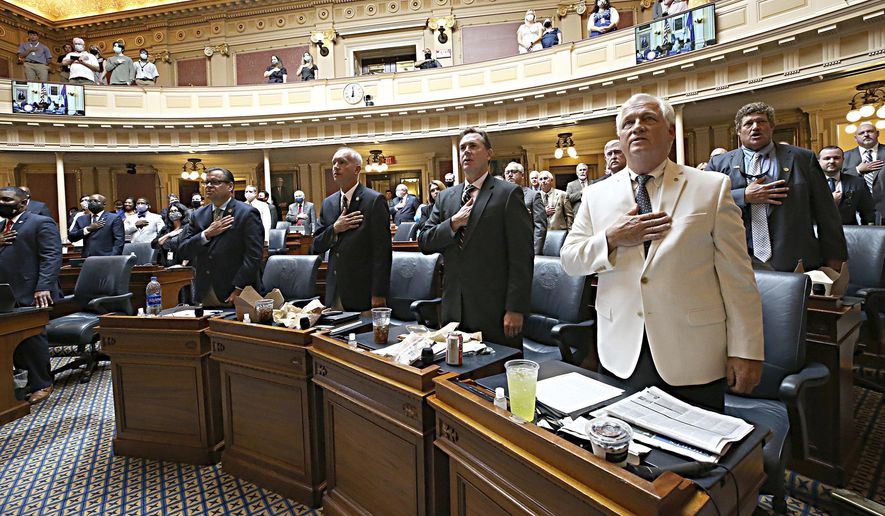Eighteen candidates running for the Virginia House of Delegates have raised more than $1 million for their campaigns in pursuit of a job that pays less than $18,000 a year.
All but one of them are Democrats.
As the party seeks to defend its 55-45 majority in the House, money has poured into its campaigns in unprecedented fashion, giving Democrats hope that they can survive what’s shaping up to be a tough environment ahead of Election Day on Tuesday.
“I am stunned by the amount of money that the Democrats are putting in the House of Delegates races,” said former Gov. James S. Gilmore, a Republican. “There are people who I didn’t know were in the House of Delegates who are getting millions of dollars.”
While most of the attention has gone to the governor’s race between Democrat Terry McAuliffe and Republican Glenn Youngkin, the battle for the House is also intense. Those contests are also billed as early tests of the political popularity of President Biden’s agenda.
Republicans see an outside chance to capture the seats needed to retake control and regain a foothold two years after losing the majority for the first time in two decades.
The money, though, gives Democrats the better odds, said Stephen J. Farnsworth, a professor of political science at Mary Washington University.
House of Delegates candidates have raised a record-setting $74 million, according to the latest tally from the nonpartisan Virginia Public Access Project. Democrats accounted for slightly more than two-thirds of that by pulling in $50.8 million.
“When control of the chamber is in question, that is a great time to raise money,” Mr. Farnsworth said. “In any reasonable world, it sounds insane that candidates are raising more than a million dollars to run for a House of Delegates seat, but that is the role that money plays in politics these days.”
The big battleground is the suburbs, where Democrats struggled when President Trump was in office. Now that Democrats control Richmond and Washington, Republicans are primed to accuse them of overreaching.
“We’re optimistic that we’ll be able to flip some seats back into the Republican column,” said Garren Shipley, a spokesman for the House Republican caucus. “There are cyclical factors working in our favor, but the biggest motivator for voters we’ve seen to date is the record of House Democrats on issues like education and public safety.”
The most vulnerable Democrats have been the biggest fundraisers.
Delegate Wendy Gooditis, who represents parts of Loudoun, Clarke and Frederick counties, leads the pack. She raked in nearly $2.9 million in the 10th District, according to the Virginia Public Access Project.
Ms. Gooditis is locked in a tough battle with Nick Clemente, who has raised nearly $1.5 million, more than any other Republican candidate for the House of Delegates.
The other top 10 fundraisers are Democrats, ranging from Delegate Alex Askew’s $2.1 million haul in the 85th District in Virginia Beach to Delegate Chris Hurst’s $1.5 million in the 12th District in Southwest Virginia.
Mr. Askew, a 36-year-old business development coordinator, and Mr. Hurst, a 34-year-old former television reporter, are among the Republicans’ top targets.
Republican Karen Greenhalgh, a small-business owner, is seeking to unseat Mr. Askew. Republican Jason Ballard, a lawyer and Army veteran, is challenging Mr. Hurst. Ms. Greenhalgh has raised $824,000, and Mr. Ballard has brought in $776,000.
The other top Republican fundraiser is Tara Durant, an elementary school teacher and wife of a Marine. Ms. Durant raised $944,000 in her bid to unseat first-term Delegate Joshua Cole. The 31-year-old incumbent pulled in $1.7 million in the 28th District, which includes parts of eastern Stafford County and the city of Fredericksburg.
Political analysts and party insiders say the fate of the House of Delegates rests in about a dozen races playing out in Northern Virginia, Hampton Roads and some of the state’s more rural areas.
House Speaker Eileen Filler-Corn, the first woman to hold the post, said Democrats deserve more time in charge after following through on promises to expand access to voting and health care, abolish the death penalty, raise the minimum wage and decriminalize marijuana use.
“There is so much at stake in this election, and if House Republicans, Glenn Youngkin and Donald Trump have their way, we know they will destroy all the historic change that we have made,” Ms. Filler-Corn, who has raised almost $1.9 million, said at a McAuliffe campaign rally with former President Barack Obama a little over a week ago.
Democrats are optimistic that their candidates’ racial, gender and age diversity bolster their chances of hanging on to power.
“That is a new brand, new energy, and that gets voters excited about candidates up and down the ballot,” said Joshua Ulibarri, a pollster for House Democrats.
Republicans are hoping Mr. McAuliffe’s recent stumbles over education messaging hurt his party’s down-ticket candidates.
“They’ve made a conscious decision to stand with Terry McAuliffe and his anti-parent stance, and it’s hurting them almost everywhere,” Mr. Shipley said.
• Seth McLaughlin can be reached at smclaughlin@washingtontimes.com.




Please read our comment policy before commenting.